 KATHY O’HARA: Eddie’s the only fella in town who doesn’t pass judgment on people.
KATHY O’HARA: Eddie’s the only fella in town who doesn’t pass judgment on people.
EDWARD D. WOOD, JR.: That’s right. If I did, I wouldn’t have any friends.
Scott Alexander and Larry Karaszewski, screenplay for Ed Wood
Terry Teachout on the arts in New York City
Today’s Wall Street Journal contains the first of two reports from Wisconsin’s American Players Theatre. This week I review The Seagull and The Doctor’s Dilemma. Here’s an excerpt.
* * *
American Players Theatre, the finest classical repertory company in the U.S., is mounting Carol Rocamora’s engagingly colloquial translation of “The Seagull” in its 1,147-seat rural open-air amphitheater. On paper that doesn’t sound like an ideal site for so intensely personal a play, but John Langs and Nayna Ramey, the director and set designer, have taken sensitive advantage of APT’s Up-the-Hill Theatre, whose long aisles allow the actors to make well-timed entrances and exits that cause the theater to seem much smaller than it is and whose woodsy surroundings are redolent of the Russian country estate where “The Seagull” takes place….
Even more important, Mr. Langs and his cast have found the right tone for “The Seagull.” That’s evident as early as the second line of the play, in which the lovesick Masha (Anne E. Thompson) proclaims just a bit too dolefully that she wears black because “I am in mourning for my life.” And what happens at APT? The audience laughs! As well they should, since we don’t yet know what’s going to happen to Masha and the other characters. Yes, they’re all in love with the wrong people, and that’s funny—but sometimes unrequited love causes those whom it afflicts to do desperate things…
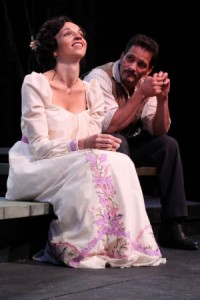 All of Mr. Langs’ actors are as deft as Ms. Thompson. Tracy Michelle Arnold is sharp and haughty as Irina, the great actress who has no time for Konstantin (Christopher Sheard), her painfully earnest son, who longs in vain to become a playwright. Jim DeVita is glamorous and preoccupied as Trigorin, Irina’s middle-aged lover, a not-quite-great writer who makes the devastating mistake of falling for Nina (Laura Rook), a hopeful young girl who, like Konstantin, burns with the dangerous urge to make art. As for Ms. Rook, a wide-eyed Chicago beauty who was extraordinarily fine in Writers’ Theatre’s 2013 production of David Ives’ “The Liar,” she’s even finer here…
All of Mr. Langs’ actors are as deft as Ms. Thompson. Tracy Michelle Arnold is sharp and haughty as Irina, the great actress who has no time for Konstantin (Christopher Sheard), her painfully earnest son, who longs in vain to become a playwright. Jim DeVita is glamorous and preoccupied as Trigorin, Irina’s middle-aged lover, a not-quite-great writer who makes the devastating mistake of falling for Nina (Laura Rook), a hopeful young girl who, like Konstantin, burns with the dangerous urge to make art. As for Ms. Rook, a wide-eyed Chicago beauty who was extraordinarily fine in Writers’ Theatre’s 2013 production of David Ives’ “The Liar,” she’s even finer here…
“The Doctor’s Dilemma,” George Bernard Shaw’s 1906 play about a group of high-society London physicians, doesn’t get done much these days, perhaps because the “dilemma” of the title seems at first glance to be a trifle schematic. If he has to choose between them, whom should the title character save: a poor but kind-hearted colleague who takes care of inner-city patients, or an indisputably great painter who’s also an unscrupulous bum? But Shaw added a neat twist to the plot by causing his big-shot doctor to fall hopelessly in love with the painter’s adoring wife, and the result is a comedy of ideas that takes the viewer on a moral roller-coaster ride…
Aaron Posner has prepared his own adaptation of the original five-act script for his American Players Theatre production, an abridged version in which the characters successively introduce themselves to the audience by reciting monologues carved out of Shaw’s stage directions. I’m skeptical about the theatrical efficacy of the latter innovation. Shaw wrote his elaborate stage directions in order to make the published versions of his scripts easier to read. To perform them onstage is supererogatory if the performances are sufficiently well characterized…
Fortunately, Mr. Posner has staged “The Doctor’s Dilemma” with a light and witty touch, and his well-calculated cuts help make the play more accessible to modern audiences….
* * *
To read my review of The Seagull, go here.
To read my review of The Doctor’s Dilemma, go here.
An excerpt from Sidney Lumet’s 1968 film of The Seagull, with James Mason as Trigorin, Kathleen Widdoes as Masha, and Vanessa Redgrave as Nina:
The trailer for Anthony Asquith’s 1958 film of The Doctor’s Dilemma, starring Dirk Bogarde and Leslie Caron:
 “The general characteristics of this disposition are not difficult to discern, although they have often been mistaken. They centre upon a propensity to use and to enjoy what is available rather than to wish for or to look for something else; to delight in what is present rather than what was or what may be. Reflection may bring to light an appropriate gratefulness for what is available, and consequently the acknowledgment of a gift or an inheritance from the past; but there is no mere idolizing of what is past and gone. What is esteemed is the present; and it is esteemed not on account of its connections with a remote antiquity, nor because it is recognized to be more admirable than any possible alternative, but on account of its familiarity: not, Verweile doch, du bist so schön, but Stay with me because I am attached to you.”
“The general characteristics of this disposition are not difficult to discern, although they have often been mistaken. They centre upon a propensity to use and to enjoy what is available rather than to wish for or to look for something else; to delight in what is present rather than what was or what may be. Reflection may bring to light an appropriate gratefulness for what is available, and consequently the acknowledgment of a gift or an inheritance from the past; but there is no mere idolizing of what is past and gone. What is esteemed is the present; and it is esteemed not on account of its connections with a remote antiquity, nor because it is recognized to be more admirable than any possible alternative, but on account of its familiarity: not, Verweile doch, du bist so schön, but Stay with me because I am attached to you.”
Michael Oakeshott, “On Being Conservative”
I ran across this ancient meme on Facebook today and decided that it wasn’t too late to play. Here goes:
1. What was the last thing you put in your mouth? A complimentary sesame pretzel. It was doubleplusungood.
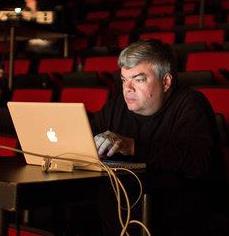 2. Where was your Facebook profile picture taken? Long Wharf Theatre in New Haven, Connecticut. (I change it according to mood, but that’s the one I posted this morning.)
2. Where was your Facebook profile picture taken? Long Wharf Theatre in New Haven, Connecticut. (I change it according to mood, but that’s the one I posted this morning.)
3. Can you play Guitar Hero? I don’t even know what it is!
4. Name someone who made you laugh today. So far, nobody.
5. How late did you stay up last night, and why? Two-thirty. I was reading a novel, William Haggard’s The Need to Know.
6. If you could move somewhere else, would you? That’s a huge “if.” All things being equal, though, I’d like to live on Florida’s Sanibel Island in the wintertime and the Berkshires in the summertime.
7. Ever been kissed under fireworks? No, but it sounds like fun.
8. Which of your friends lives closest to you? My next-door neighbor.
9. Do you believe exes can be friends? Absolutely.
 10. How do you feel about Dr Pepper? I’ve loved it ever since I was a boy. I actually visited the Dr Pepper Museum a couple of years ago.
10. How do you feel about Dr Pepper? I’ve loved it ever since I was a boy. I actually visited the Dr Pepper Museum a couple of years ago.
11. When was the last time you cried really hard? The day after my mother died.
12. Who took your profile picture? A photographer for the New York Times.
13. Who was the last person you took a picture of? Mrs. T. (I scarcely ever take pictures of anyone else.)
14. Was yesterday better than today? Yes. (Today has been pretty crappy, actually.)
15. Can you live a day without TV? Of course—I do it all the time. I turned on my hotel-room TV just once last week, and I turned it off again seconds later.
16. Are you upset about anything? No. Worried, yes; upset, no.
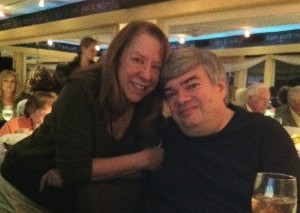 17. Do you think relationships are ever really worth it? My God, yes.
17. Do you think relationships are ever really worth it? My God, yes.
18. Are you a bad influence? I certainly hope not.
19. Night out or night in? Tonight, in.
20. What items could you not go without during the day? I’d hate to be without a book or two.
21. Who was the last person you visited in the hospital? Mrs. T.
22. What does the last text message in your inbox say? “Yes, we did.”
23. How do you feel about your life right now? Pretty good.
24. Do you hate someone? Nobody whom I know personally.
25. If we were to look in your Facebook inbox, what would we find? Nothing.
26. Could you pass a drug test right now? Yes.
27. Has anyone ever called you perfect before? Not seriously.
28. What song is stuck in your head? For the moment, Charlie Parker’s “Billie’s Bounce.” It’ll almost certainly change within the hour, though. My earworms come and go with clock-like frequency.
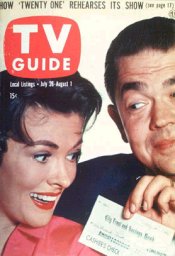 29. Someone knocks on your door at two a.m. Who do you want it to be?
Michael Anthony.
29. Someone knocks on your door at two a.m. Who do you want it to be?
Michael Anthony.
30. Want to have grandchildren by the time you’re fifty? Too late!
31. Name something you have to do tomorrow. Drive from Connecticut to Manhattan and back again, arrgh.
32. Do you think too much or too little? Much too much.
33. Do you smile a lot? Absolutely.
This essay about James Gould Cozzens’ Guard of Honor originally appeared in National Review in 2009. It’s never been reprinted, nor has it been available on line until now. I post it in order to draw your attention to a near-forgotten book that I consider to be one of the best American novels of the twentieth century.
* * *
Novelists don’t always write about what they know, but when something interesting happens to them, it usually winds up in a book. World War II was the most interesting thing that happened to most of the American novelists who served in it, and most of them duly produced novels based on their experiences, nearly all of which are forgotten. (Who now reads Irwin Shaw’s The Young Lions or Gore Vidal’s Williwaw?) The more I read in the literature of the Good War, the more certain I am that it is in memoirs like Donald R. Burgett’s Currahee! and E.B. Sledge’s With the Old Breed and the dispatches of such journalists as A.J. Liebling and Ernie Pyle that the very best American wartime writing is to be found—with a single exception. Of the countless novels of World War II written by American vets, the only one to which I return regularly is James Gould Cozzens’ Guard of Honor.
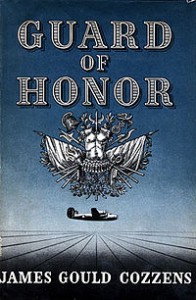 If you’ve never heard of Guard of Honor, you’re not alone. Though it won a Pulitzer Prize in 1949, it is as poorly remembered as the rest of Cozzens’ novels, and I doubt that it is ripe for revival. Set in a stateside Army Air Force base nine months before D-Day, most of its main characters are desk jockeys who almost certainly never made it to Europe or the South Pacific. Not surprisingly, nobody ever thought to turn the exploits of these indispensable yet invisible warriors into a movie; probably, nobody ever will. Yet Guard of Honor is a great novel all the same, the only English-language novel of World War II that can withstand comparison with Evelyn Waugh’s Sword of Honour.
If you’ve never heard of Guard of Honor, you’re not alone. Though it won a Pulitzer Prize in 1949, it is as poorly remembered as the rest of Cozzens’ novels, and I doubt that it is ripe for revival. Set in a stateside Army Air Force base nine months before D-Day, most of its main characters are desk jockeys who almost certainly never made it to Europe or the South Pacific. Not surprisingly, nobody ever thought to turn the exploits of these indispensable yet invisible warriors into a movie; probably, nobody ever will. Yet Guard of Honor is a great novel all the same, the only English-language novel of World War II that can withstand comparison with Evelyn Waugh’s Sword of Honour.
Cozzens, who died in 1978, is one of the least likely people to have made the cover of Time—though it wasn’t Guard of Honor that put him there. By Love Possessed, the 1957 best seller that won Cozzens a bit more than fifteen minutes’ worth of fame, was the occasion for an otherwise sympathetic cover story that portrayed him as a misanthropic grouch. Dwight Macdonald cherry-picked the story for quotes that he used to devastating effect in “By Cozzens Possessed,” a no-holds-barred assault on By Love Possessed that dismissed it as a windy exercise in middlebrow mediocrity. Alas, the essay was both clever and not entirely wrongheaded—By Love Possessed is the weakest of Cozzens’ major novels—and it did so much damage to his reputation that his masterpiece vanished in the rubble.
To read Guard of Honor after reading “By Cozzens Possessed” is to wonder whether Macdonald might possibly have had some other James Gould Cozzens in mind. Guard of Honor is almost as long as By Love Possessed, but it’s written with a disciplined tautness that makes it feel much shorter. At the same time, anyone familiar with both books will see at once that they are, like all of Cozzens’ novels, cut from the same cloth. He had many settings but only one subject—the near-insurmountable obstacles that stand in the way of shedding youthful illusions and seeing the world as it really is—and in Guard of Honor he explored it so fully as to leave himself with nothing new to say for the remainder of his writing life.
Guard of Honor takes place during forty-eight hours at Ocanara Army Air Base, located somewhere in central Florida. Most of the novel’s characters are seen through the eyes of Colonel Norman Ross and Captain Nathaniel Hicks, neither of whom is a career officer. Ross is a sixty-year-old judge, Hicks a thirty-eight-year-old magazine editor. Both men suppose themselves to be clear-eyed realists, and both find in due course that they still have more than a few things to learn about human nature, theirs included: “There never could be a man so brave that he would not sometime, or in the end, turn part or all coward; or so wise that he was not, from beginning to end, part ass if you knew where to look; or so good that nothing at all about him was despicable.”
The occurrence that opens their eyes is a short-lived protest by a group of black pilots who are enraged when they are told that they cannot be admitted to the whites-only Ocanara officers club but must stick to their own segregated facility. This protest, which is based on a real-life incident, is like a stone tossed in the water of Cozzens’ complicated plot. Its ripples touch all of the novel’s characters, most of whom did not see what happened and only know about it through more or (mostly) less accurate scuttlebutt. Colonel Ross’ job is to paper over the protest and protect the reputation of Ira Beal, the base commander, a talented but immature pilot who is being groomed by his Pentagon superiors for bigger things.
None of this is the stuff of which John Wayne movies are made, but it is enthralling all the same, for in telling the story of the protest and its aftermath, Cozzens takes the reader on an infinitely knowing guided tour of Ocanara, in the process showing how things get done in wartime, how they go wrong, and how they get fixed—or not. Along the way we meet people from every walk of life, each of whom is sketched with arresting exactitude. If that makes Guard of Honor sound like Grand Hotel, rest assured that Cozzens never stoops to once-over-lightly typecasting. His characters, the women included, are individual and recognizable, and before long you find yourself caring very deeply about what is to become of them.
Though we see much of Captain Hicks, who finds himself pulled almost unwittingly into an extramarital involvement with a lonely WAC lieutenant who is the novel’s most sensitively drawn character, it is Colonel Ross whose voyage of self-discovery lies at the heart of Guard of Honor. He is, like Melville’s Captain Vere, an old man who has experienced much—one of the Wright brothers taught him to fly—and a lifetime of labor in the vineyards of politics has taught him equally hard lessons about the differences between what men say in public and what they do in private. Yet he is taken aback to find that there are younger men of higher rank who cast an even colder eye on the inevitable limitations of their fellow men, and is chastened by the knowledge that he is, like most of us, a man whose experience “fitted him to advise others, rather than himself.”
Colonel Ross, we learn, is both a stoic and a pragmatist. Though he has come to the reluctant conclusion that life has no meaning, he also knows that the war against the Axis must be won if unimaginable horrors are not to be loosed on the world, and that in the long run it will likely be won less by heroism than by sheer determination: “A man must stand up and do the best he can with what there is….If mind failed you, seeing no pattern; and heart failed you, seeing no point, the stout, stubborn will must be up and doing. A pattern should be found; a point should be imposed.”
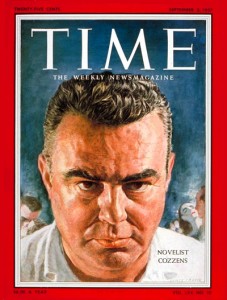 Part of what makes Guard of Honor so memorable is that its disillusion is untainted by cynicism. Cozzens spent most of the war pushing paper in the Pentagon, an experience that would have inspired the average novelist to write a very different kind of book. Instead he came away believing that most of the people whom he met while in uniform had done their best to do the right thing and, more often than not, did it pretty well.
Part of what makes Guard of Honor so memorable is that its disillusion is untainted by cynicism. Cozzens spent most of the war pushing paper in the Pentagon, an experience that would have inspired the average novelist to write a very different kind of book. Instead he came away believing that most of the people whom he met while in uniform had done their best to do the right thing and, more often than not, did it pretty well.
The result of his experience is a book that might well be described as the inverse of Catch-22, just as Cozzens himself was as different from Joseph Heller as a man can be. Guard of Honor, to be sure, is full of pointed humor, much of it at the expense of prigs. Yet Cozzens never makes fun of anyone who hasn’t earned it, nor does he suggest that the Army’s flaws and foolishnesses negate the purpose for which it exists. Midway through the novel, Captain Hicks compares the “simple, unlimited integrity” of Regular Army officers like General Beal who “accepted as the law of nature such elevated concepts as the Military Academy’s Duty-Honor-Country” to the more fashionable views of “men who considered it the part of intelligence to admit that Honor was a hypocritical social sanction protecting the position of a ruling class; or that Duty was self-interest as it appeared when sanctions like Honor had fantastically distorted it.” Amused by the thought of what the general would make of such high-minded folk, Hicks imagines him retorting, “What the hell kind of person thought things like that?”
That General Beal’s “simplicity” should be tacitly presented by Cozzens as admirable goes a long way toward explaining why Catch-22 is far better known than Guard of Honor—especially by youngsters who know little of the way the world works. When I was in high school, I was sure that Catch-22 was one of the great American novels. Now I find the baby-black antics of Yossarian and his jeering buddies to be embarrassingly jejune, whereas my admiration for Guard of Honor deepens every time I return to it, as I do every year or two. Perhaps I would admire it less if I had had to go to war, but I doubt it. One need not have dodged bullets to know the sharp tang of truth.
Here’s my list of recommended Broadway, off-Broadway, and out-of-town shows, updated weekly. In all cases, I gave these shows favorable reviews (if sometimes qualifiedly so) in The Wall Street Journal when they opened. For more information, click on the title.
BROADWAY:
• Cabaret (musical, PG-13/R, nearly all performances sold out last week, closes Jan. 4, reviewed here)
• A Gentleman’s Guide to Love & Murder (musical, PG-13, all performances sold out last week, reviewed here)
• Matilda (musical, G, all performances sold out last week, reviewed here)
• Les Misérables (musical, G, too long and complicated for young children, nearly all performances sold out last week, reviewed here)
• Once (musical, G/PG-13, reviewed here)
OFF BROADWAY:
• The Fantasticks (musical, G, suitable for children capable of enjoying a love story, reviewed here)
IN NIAGARA-ON-THE-LAKE, ONTARIO:
• Arms and the Man (comedy, G/PG-13, closes Oct. 18, reviewed here)
• The Sea (black comedy, PG-13, closes Oct. 26, closes Oct. 12, reviewed here)
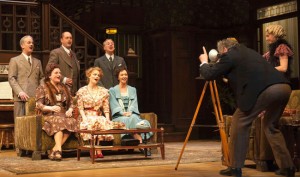 • When We Are Married (comedy, PG-13, closes Oct. 26, reviewed here)
• When We Are Married (comedy, PG-13, closes Oct. 26, reviewed here)
CLOSING NEXT WEEK IN MADISON, N.J..:
• The Alchemist (verse comedy, PG-13, closes Aug. 31, reviewed here)
CLOSING NEXT WEEK IN GARRISON, N.Y.:
• The Liar (verse comedy, PG-13, closes Aug. 31, reviewed here)
• Othello (Shakespearean tragedy, PG-13, closes Aug. 30, reviewed here)
• Two Gentlemen of Verona (Shakespearean comedy, PG-13, closes Aug. 29, reviewed here)
CLOSING SATURDAY OFF BROADWAY:
• Between Riverside and Crazy (serious comedy, PG-13, reviewed here)
CLOSING SUNDAY ON BROADWAY:
• Bullets Over Broadway (musical, PG-13, reviewed here)
| M | T | W | T | F | S | S |
|---|---|---|---|---|---|---|
| 1 | 2 | 3 | ||||
| 4 | 5 | 6 | 7 | 8 | 9 | 10 |
| 11 | 12 | 13 | 14 | 15 | 16 | 17 |
| 18 | 19 | 20 | 21 | 22 | 23 | 24 |
| 25 | 26 | 27 | 28 | 29 | 30 | |
An ArtsJournal Blog